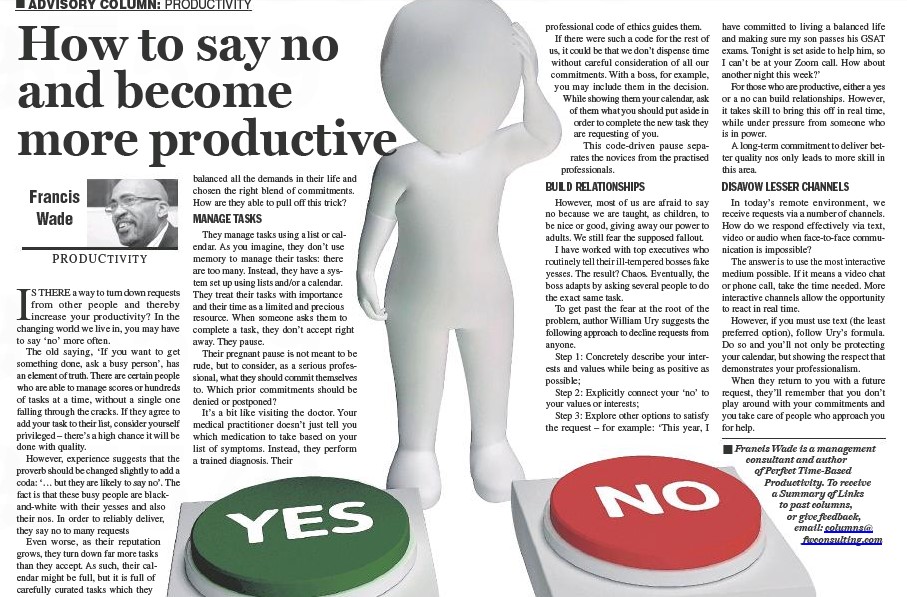Is there a way to turn down requests from other people and thereby increase your productivity? In the changing world we live in, you may have to say more No’s.
“If you want to get something done, ask a busy person.” This old saying has an element of truth: there are certain people who are able to manage scores or hundreds of tasks at a time, without a single one falling through the cracks. If they agree to add your task to their list, consider yourself privileged: there’s a high chance it will be done with quality.
However, experience suggests that the quote should be changed slightly to add a coda: “…but they are likely to say ‘No’.” The fact is that these busy people are black and white with their Yes’s and also their No’s. In order to reliably deliver, they must say “No” to many requests. Even worse, as their reputation grows, they turn down far more tasks than they accept.
As such, their calendar might be full. But what is it full of? Carefully curated tasks which they juggle with precision. They have balanced all the demands in their life and chosen the right blend of commitments. How are they able to pull off this trick?
1. Manage Tasks Using a List or Calendar
As you imagine, they don’t use memory to manage their tasks: there are too many. Instead, they have a system set up using lists and/or a calendar. They treat their tasks with importance and their time as a limited and precious resource. When someone asks them to complete a task, they don’t accept right away…they pause.
Their pregnant pause is not meant to be rude, but to consider, as a serious professional, what they should commit themselves to. Which prior commitments should be denied or postponed?
It’s a bit like visiting the doctor. Your medical practitioner doesn’t just tell you which medication to take based on your (supposed) list of symptoms. Instead, he/she performs a trained diagnosis. Their professional code of ethics guides them.
If there were such a code for the rest of us, it could be: “I don’t dispense time without careful consideration of all my commitments”. With a boss, for example, you may include the requestor in the decision, while showing him/her your calendar: “What should I put aside in order to complete this new task?”
This code-driven pause separates the novices from the practiced professionals.
2. Build Relationships
However, most of us are afraid to say “No” because we are taught, as children, to be nice or good, giving away our power to adults. We still fear the supposed fallout.
I have worked with top executives who routinely tell their ill-tempered bosses fake “Yes’s”. The result? Chaos. Eventually, the boss adapts by asking several people to do the exact same task.
To get past the fear at the root of the problem, author William Ury suggests the following approach to decline requests from anyone.
Step 1 – concretely describe your interests and values, while being as positive as possible
Step 2 – explicitly connect your “No” to your values/interests
Step 3 – explore other options to satisfy the request
For example: “This year I have committed to living a balanced life and making sure my son passes his GSAT’s. Tonight is set aside to help him, so I can’t be at your Zoom call. How about another night this week?”
For those who are productive, either a “Yes” or a “No” can build relationships. However, it takes skill to bring this off in real-time, under pressure from someone who is in power.
A long-term commitment to deliver better quality “No’s” only leads to more skill in this area.
3. Disavow Lesser Channels
In today’s remote environment, we receive requests via a number of channels. How do we respond effectively via text, video or audio when face-to-face communication is impossible?
The answer is to use the most interactive medium possible. If it means a video-chat or phone call, take the time needed. More interactive channels allow the opportunity to react in real-time.
However, if you must use text (the least preferred option), follow Ury’s formula. Do so and you’ll not only be protecting your calendar, but showing the respect that demonstrates your professionalism.
When they return to you with a future request, they’ll remember: you don’t play around with your commitments and you take care of people who approach you for help.
Francis Wade is the author of Perfect Time-Based Productivity, a keynote speaker and a management consultant. To search prior columns on productivity, strategy, engagement and business processes, send email to columns@fwconsulting.com

